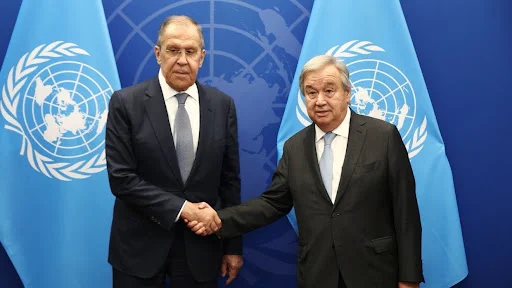Eighty years after the historic Yalta Conference that shaped the post-World War II global order, Russian Foreign Minister Sergey Lavrov has reignited the debate on international governance, insisting that the United Nations Charter must remain the cornerstone of a multipolar world. His remarks, made against the backdrop of intensifying global tensions, highlight the growing divide between emerging powers and the Western bloc, raising questions about the future of international cooperation.
The Yalta Legacy and Its Challenges
The Yalta Conference of 1945, attended by leaders of the Allied Powers—Joseph Stalin, Franklin D. Roosevelt, and Winston Churchill—laid the foundation for the modern international system, including the establishment of the United Nations. The agreements reached at Yalta and later at Potsdam were meant to ensure peace through sovereign equality and a commitment to international law. However, Lavrov argues that these principles have been consistently undermined by Western actions, which he says prioritize geopolitical dominance over genuine cooperation.
According to Lavrov, former U.S. officials have openly criticized the post-war order, promoting a revisionist agenda that disregards established international agreements. This shift, he claims, has led to unilateral interventions, economic sanctions, and attempts to dictate global policy without broad-based consensus. "The very foundation of international law is at stake," Lavrov warned, stating that Western nations have disregarded key principles that were meant to prevent future conflicts.
The Rise of a Multipolar World
With the rapid rise of economic and political power in regions like Asia, Africa, and Latin America, the traditional unipolar or bipolar order is being challenged. Countries in the Global South are asserting themselves, demanding a greater voice in global affairs, particularly in institutions like the United Nations Security Council (UNSC).
Lavrov stressed that the world is no longer dominated by a single power center, and governance structures must evolve to reflect these new realities. "Reforming the UN Security Council is not just an option—it is a necessity," he declared, emphasizing the need for fairer representation that includes voices from regions historically marginalized in global decision-making.
Russia, along with other nations advocating for a multipolar world, has pushed for changes that would grant permanent UNSC membership to countries from Africa and Latin America, allowing for a more balanced global power structure. This, Lavrov argues, would reinforce the original vision of the UN as a forum for cooperation rather than a tool for political maneuvering by dominant powers.
UN Charter: A Safeguard Against Global Chaos?
At the heart of Lavrov’s message is the assertion that the UN Charter remains the best safeguard against the kind of global chaos seen in the first half of the 20th century. He criticized what he described as Western efforts to undermine international law through military interventions, regime-change policies, and economic coercion. "The UN Charter was designed to prevent global conflict, not to serve the interests of a select few," he asserted.
As global tensions continue to rise—from ongoing conflicts in Ukraine and the Middle East to economic rivalries between major powers—Lavrov’s call for adherence to the UN Charter resonates with many nations seeking stability and fairness in international relations. However, whether his appeal will lead to tangible changes in global governance remains uncertain.
With the world moving toward multipolarity, the question remains: will major global players embrace true sovereign equality, or will history repeat itself with yet another struggle for dominance?
Tags
International

